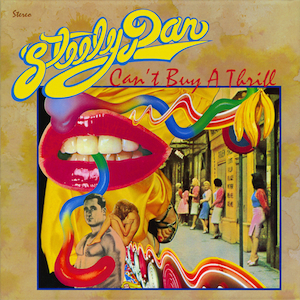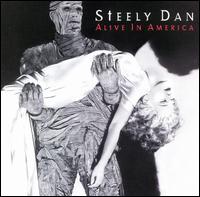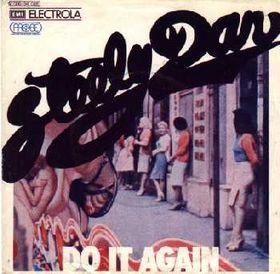
Steely Dan is an American rock band founded in 1971 in New York by Walter Becker and Donald Fagen. Originally having a full band lineup, by the end of 1974 Becker and Fagen chose to stop playing live and continue Steely Dan as a studio-only duo, utilising a revolving cast of session musicians. Rolling Stone has called them "the perfect musical antiheroes for the seventies".

Donald Jay Fagen is an American musician who was the co-founder, lead singer, co-songwriter, and keyboardist of the band Steely Dan, formed in the early 1970s with musical partner Walter Becker. In addition to his work with Steely Dan, Fagen has released four solo albums, beginning with The Nightfly in 1982, which was nominated for seven Grammys.

Can't Buy a Thrill is the debut studio album by American rock band Steely Dan, released by ABC Records in November 1972. It was written by band members Walter Becker and Donald Fagen, and recorded in August 1972 at the Village Recorder in Los Angeles with producer Gary Katz. The album is one of Steely Dan's most stylistically eclectic, encompassing the sounds of soft rock, folk rock, jazz-rock and pop, alongside philosophical, elliptical lyrics.

Countdown to Ecstasy is the second studio album by American rock band Steely Dan, released by ABC Records in July 1973. It was recorded at the Village Recorder in West Los Angeles, California, except for Rick Derringer's slide guitar part for "Show Biz Kids", which was recorded at Caribou Ranch in Nederland, Colorado. After the departure of vocalist David Palmer from Steely Dan, the group recorded the album with Donald Fagen singing lead on every track.

Katy Lied is the fourth studio album by American rock band Steely Dan, released by ABC Records in March 1975; reissues have been released by MCA Records since ABC Records was acquired by MCA in 1979. It was the first album the group made after they stopped touring, as well as their first to feature backing vocals by Michael McDonald.

The Royal Scam is the fifth studio album by American rock band Steely Dan, released by ABC Records in 1976; reissues have been released by MCA Records since ABC Records was acquired by MCA in 1979. It was produced by Gary Katz. In the United States, the album peaked at number 15 on the Billboard Top LPs & Tape chart, and it has been certified Platinum by the Recording Industry Association of America (RIAA).

Two Against Nature is the eighth studio album by American rock band Steely Dan. Their first studio album in 20 years, it was recorded from 1997 to 1999 and released on February 29, 2000, by Giant Records.

Alive in America is a live album by the American rock group Steely Dan, released in 1995. It is Steely Dan's first live album. The album comprises recordings from their 1993 and 1994 tours, which were the first live Steely Dan performances since 1974.
David Palmer is an American vocalist, songwriter, and photographer, best known as a former member of Steely Dan and as the lyricist of the Carole King number two hit, "Jazzman".

"Kid Charlemagne" is a song by the rock group Steely Dan, which was released as a single from their 1976 album The Royal Scam as its opening track and reached number 82 in the Billboard charts. It is a fusion of a funk rhythm and jazz harmonies with rock and roll instrumentals and lyrical style. The guitar solo by jazz fusion guitarist Larry Carlton was ranked #80 in the list of the 100 greatest guitar solos by Rolling Stone.
Dennis Dias is an American guitarist, best known for being a founding member of Steely Dan.

"Hey Nineteen" is a song by the band Steely Dan from their album Gaucho (1980).

Showbiz Kids: The Steely Dan Story, 1972–1980 is a two-disc compilation album by Steely Dan, released in 2000.
"Show Biz Kids" is a song composed by Walter Becker and Donald Fagen and performed by Steely Dan with Rick Derringer on slide guitar. It was the first single from Steely Dan's 1973 album Countdown to Ecstasy, and reached number 61 on the Billboard Hot 100. It was edited for the single release.

Steely Dan is a compilation album by Steely Dan, released in Japan in 1978. It is notable as being the only album release of both sides of the 1972 single "Dallas" b/w "Sail the Waterway", although these are in mono and were sourced from a copy of the single.

The Best of Steely Dan: Then and Now is a compilation album by Steely Dan, released in 1993. The album cover is a photograph of Carhenge in Nebraska.

"Do It Again" is a 1972 song composed and performed by American rock group Steely Dan, who released it as a single from their debut album Can't Buy a Thrill as its opening track. The single version differed from the album version, shortening the intro and outro and omitting the organ solo.
"Any Major Dude Will Tell You" is a song written by Donald Fagen and Walter Becker that was first released by Steely Dan on their 1974 album Pretzel Logic. It was also released as the B-side of the first single from that album "Rikki Don't Lose That Number". It was later released on several of the band's compilation albums.

"Josie" is a song written by Walter Becker and Donald Fagen and first released by Steely Dan on their 1977 album Aja. It was also released as the third single from the album and performed modestly well, reaching number 26 on the Billboard Hot 100 and number 44 on the Easy Listening chart that year. It has appeared on several Steely Dan live and compilation albums.
"Aja" is a jazz rock song, with elements of jazz fusion and progressive rock, by the American rock band Steely Dan from the album of the same name, their sixth studio album, released in 1977. Composers Becker and Fagen play guitar and synthesizer, respectively, with studio musicians playing the other parts. Fagen sings lead vocals. Production duties were handled by Gary Katz; the album was released through ABC Records. Musically, it is tonally sophisticated and a structurally complex work that was praised upon release as the most ambitious track the duo had ever attempted. The song's lyrics voice the interior monologue of a man who runs to the title character to escape the stresses of his life "up on the hill." Fagen claimed that it was inspired by the relative of an acquaintance, who had married a Korean woman named Aja. He has described the song as being about the "tranquility that can come of a quiet relationship with a beautiful woman."















